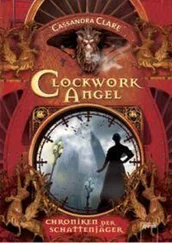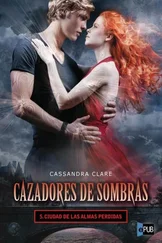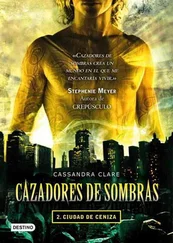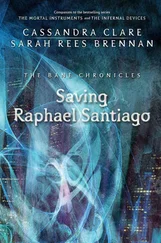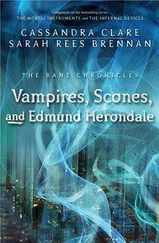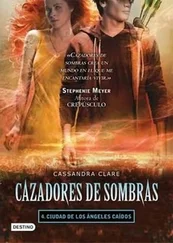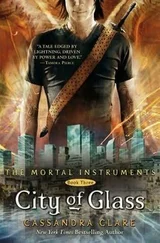My enemies. She thought of Nate, his hand closing on hers as he died, bloody, in her lap. She thought of Jem again, the way he never railed against his fate but faced it down bravely; she thought of Charlotte, who wept over Jessamine’s death, though Jessie had betrayed her; and she thought of Will, who had laid down his heart for her and Jem to walk upon because he loved them more than he loved himself.
There was human goodness in the world, she thought—all caught up with desires and dreams, regrets and bitterness, resentments and powers, but it was there, and Mortmain would never see it.
“You will never understand,” she said. “You say that you build, that you invent, but I know an inventor—Henry Branwell—and you are nothing like him. He brings things to life; you just destroy. And now you bring me another dead demon, as if it were flowers rather than more death. You have no feelings, Mr. Mortmain, no empathy for anyone. If I had not known it before, it would have been made abundantly clear when you tried to use James Carstairs’s illness to force me to come here. Though he is dying because of you, he wouldn’t allow me to come—wouldn’t take your yin fen . That’s how good people behave.”
She saw the look on his face. Disappointment. It was only there for a moment, though, before it was wiped away with a shrewd look. “Wouldn’t allow you to come?” he said. “So I did not misjudge you; you would have done it. Would have come to me, here, out of love.”
“Not love for you.”
“No,” he said thoughtfully, “not for me,” and he drew from his pocket an object that Tessa recognized immediately.
She stared at the watch he held out to her, dangling on its gold chain. It was clearly unwound. The hands had long ago stopped spinning, the time seemingly frozen at midnight. The initials J.T.S. were carved on the back in elegant script.
“I said there were two reasons I created you,” he said. “This is the second. There are shape-shifters in the world: demons and magicians who can take on the appearance of others. But only you can truly become someone else. This watch was my father’s. John Thaddeus Shade. I beg of you to take this watch and Change into my father so I may speak with him one more time. If you do that, I will send all the yin fen I have in my possession—and it is a considerable amount—to James Carstairs.”
“He will not take it,” Tessa said immediately.
“Why not?” His tone was reasonable. “You are no longer a condition of the drug. It is a gift, freely given. It would be foolish to throw it away, and avail nothing. Whereas by doing this small thing for me, you may well save his life. What do you say to that, Tessa Gray?”
* * *
Will. Will, wake up.
It was Tessa’s voice, unmistakably, and it brought Will bolt upright in the saddle. He caught at Balios’s mane to steady himself and looked around blearily.
Green, gray, blue. The vista of Welsh countryside spread out before him. He had passed Welshpool and the England-Wales border sometime around dawn. He remembered little of his journey, only a continuous, tortuous progression of places: Norton, Atcham, Emstrey, Weeping Cross, diverting himself and his horse around Shrewsbury, and finally, finally the border and Welsh hills in the distance. They had been ghostly in the morning light, everything shrouded in mist that had burned off slowly as the sun had risen overhead.
He guessed he was somewhere near Llangadfan. It was a pretty road, laid over an old Roman byway, but almost empty of habitation apart from the occasional farm, and it seemed endlessly long, longer than the gray sky stretching overhead. At the Cann Office Hotel he had forced himself to stop and take some food, but only for moments. The journey was what mattered.
Now that he was in Wales, he could feel it—the draw in his blood toward the place where he had been born. Despite all Cecily’s words, he had not felt the connection in him until now—breathing Welsh air, seeing the Welsh colors: the green of hills, gray of slate and sky, the pallor of whitewashed stone houses, the ivory dots of sheep against the grass. Pine and oak trees were dark emerald in the distance, higher up, but closer to the road the vegetation grew green-gray and ochre.
As he moved farther into the heart of the country, the soft green rolling hills grew starker, the road steeper, and the sun began to sink toward the rim of the distant mountains. He knew where he was now, knew when he passed into the Dyfi Valley, and the mountains in front of him thrust up, stark and ragged. The peak of Car Afron was on his left, a tumble of gray slate and shingle like broken gray spiderweb across its side. The road was steep and long, and as Will urged Balios up it, he slumped in the saddle and, against his will, drifted out of consciousness. He dreamed of Cecily and Ella running up and down hills not unlike these, calling after him, Will! Come and run with us, Will! And he dreamed of Tessa and her hands held out for him, and he knew he could not stop, could not stop until he reached her. Even if she never looked at him like that in waking life, even if that softness in her eyes was for someone else. And sometimes, as now, his hand would slip into his pocket and close around the jade pendant there.
Something struck him hard from the side; he released the pendant as he fell, jarringly, onto the rocky grass by the side of the road. Pain shot up his arm, and he rolled to the side just in time to avoid Balios crumpling to the earth beside him. It took him a moment, gasping, to realize that they had not been attacked. His horse, too exhausted to take another step, had collapsed beneath him.
Will heaved himself up to his knees and crawled to Balios’s side. The black horse lay lathered in foam, his eyes rolling upward pitifully toward Will as Will neared him and flung an arm around his neck. To his relief the horse’s pulse was steady and strong. “Balios, Balios,” he whispered, stroking the animal’s mane. “I am sorry. I should not have ridden you like that.”
He remembered when Henry had bought the horses and was trying to decide what to name them. Will had been the one to suggest their names: Balios and Xanthos, after the immortal horses of Achilles. We two can fly as swiftly as Zephyrus, who they say is the fleetest of all winds.
But those horses had been immortal, and Balios was not. Stronger than an ordinary horse, and faster, but every creature had its limits. Will lay down, his head spinning, and stared up at the sky—like a gray sheet pulled tight, touched here and there with streaks of black cloud.
He had thought, once, in the brief moments between the lifting of the “curse” and the knowledge that Jem and Tessa were engaged, of bringing Tessa here to Wales, to show her the places he had been as a child. He had thought to take her down to Pembrokeshire, to walk around Saint David’s Head and see the cliff-top flowers there, to see the blue sea from Tenby and find seashells at the tide lines. These all seemed the distant fancies of a child now. There was only the road ahead, more riding and more exhaustion, and probable death at the end of it.
With another reassuring pat on his horse’s neck, Will heaved himself to his knees and then his feet. Fighting dizziness, he limped to the crest of the hill, and looked down.
A small valley lay below him, and within it was cradled a diminutive stone village, little bigger than a hamlet. He took his stele from his belt and wearily carved a Vision rune into his left wrist. It lent him enough power to see that the village had a square, and a small church. It would almost certainly have some sort of public house where he could rest for the night.
Читать дальше

